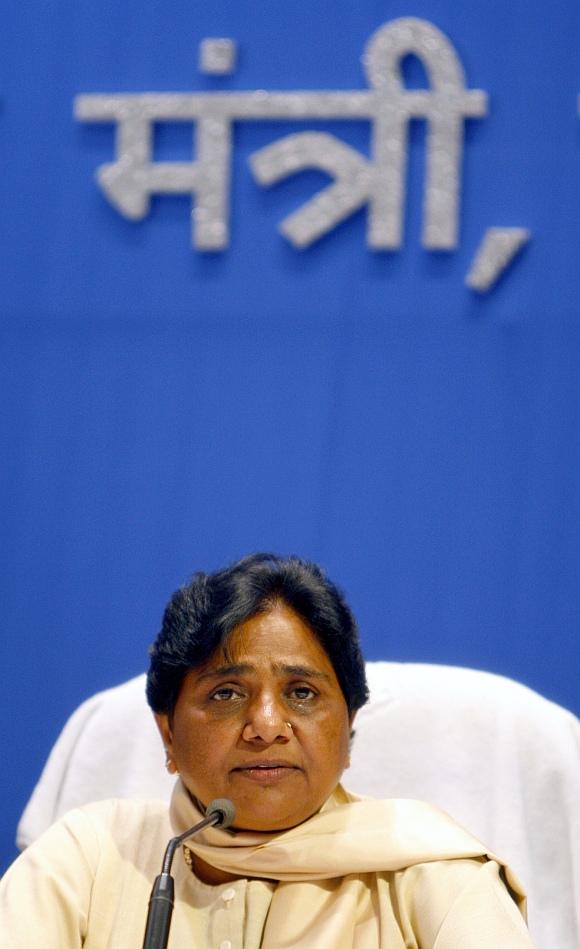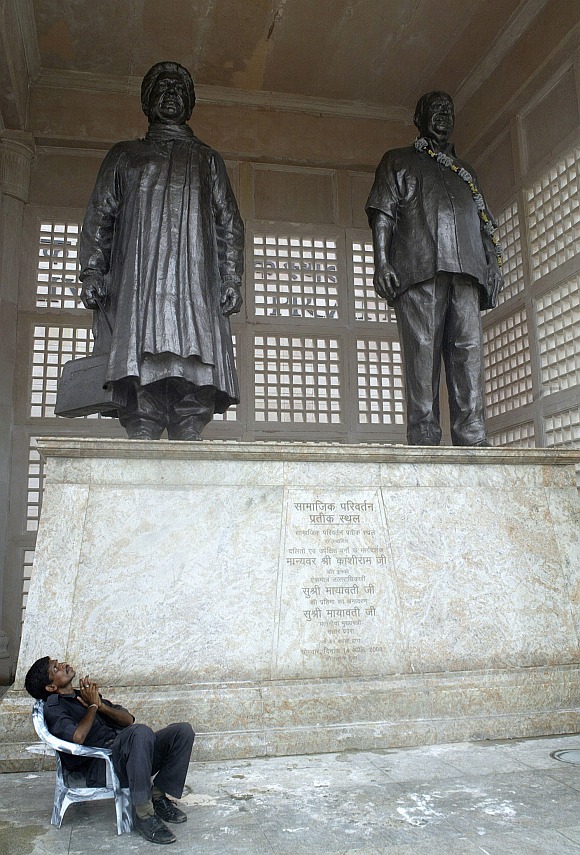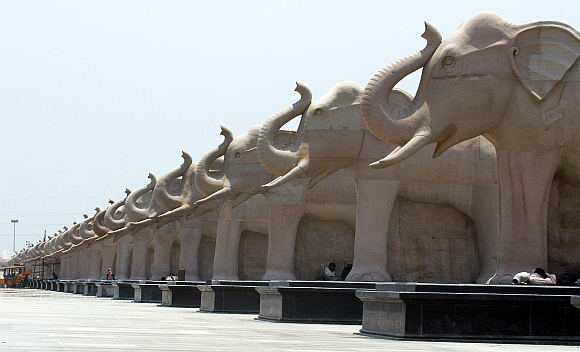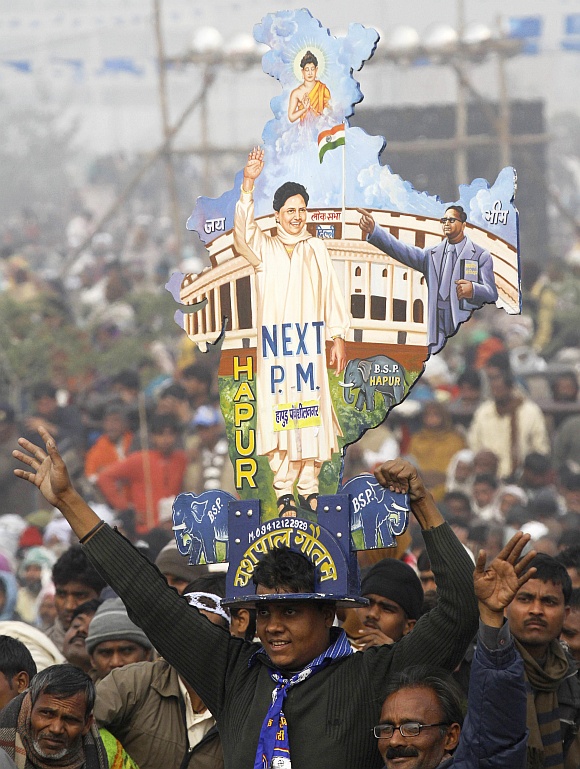
Sharat Pradhan elaborates why Mayawati's current innings as UP CM ended the way it did.
Not even members of Mayawati's inner coterie expected her to bounce back with the same ease that she had demolished what was then widely perceived as the 'goonda raj' of Samajwadi Party chief Mulayam Singh Yadav.
Yet, there was a glimmer of hope that the Bahujan Samaj Party supremo could still pull off 140-odd seats in the 403-member Uttar Pradesh state assembly, thereby enabling her party to attract support from either the Congress or the Bharatiya Janata Party, for each of whom they speculated 70 to 80 seats, to once again forge 'Behenji' to power -- no matter if it were through a coalition.
No sooner did the electronic voting machines began yielding its conclusions on Tuesday morning, the despondent picture of its plight began to hit the BSP hard, and its president who, as UP chief minister ran India's most populous state like her private fiefdom.
Well before the counting of votes commenced at 8 am on March 6, Mayawati moved out of 4 Kalidas Marg, the UP chief minister's official residence, which she had converted into an inaccessible and impregnable fortress.
Please ...

Mayawati shifted to another home on Tuesday morning -- one carefully built under her personal supervision -- at 13-A Mall Avenue, that was allotted to her after her first, brief, stint as chief minister.
Like her predecessors, she was entitled to government accommodation as part of UP political tradition.
In her case though, not only was the original bungalow extended to a neighbouring government office premises, but a massive new building was erected on what became a nearly 70,000 square feet plot in a most coveted Lucknow area, at a cost of more than Rs 540 million.
Installed on the premises are giant-sized statues of herself and her mentor, the late BSP founder Kanshi Ram.
It was such disdain for the public mood that undid a leader who just five years ago won 206 assembly seats, propelling her party to power entirely on its own for the first time.
She failed to realise that it was not just all about the rainbow coalition of castes and communities she had assembled which won her the fish and loaves of office, but primarily an anti-Mulayam Singh Yadav vote that gave her BSP an incredible lead, back in 2007.
Please ...

Ironically, a similar anti-Mayawati wave brought her empire down. The very people of UP, who had invested their faith in her to take the state out of Mulayam Singh Yadav's 'misrule', paid her back with that same coin when she shut her doors to them.
Holed up in her home, where only a select few had access, Mayawati increasingly looked arrogant and authoritarian, more than ever before.
Virtually conducting all business from her home, where security was enhanced with every passing year, Mayawati became India's only chief minister to shun office.
She visited the chief minister's office occasionally for cabinet meetings; later, these encounters became rituals.
Her fortress home at Kalidas Marg granted no access to her ministers or bureaucrats, forget commoners. The UP chief minister's traditional Janata Darbar, which had allowed anyone on the street to take her/his grievance directly to the CM, was abruptly discontinued.
None other than those specifically summoned by Mayawati were allowed anywhere close to the chief minister's home.
Only four ministers and an equal number of bureaucrats enjoyed the privilege of free access to her. Her security advisers hyped the threat perceptions to her person to such disproportionate levels that Mayawati believed that inaccessibility was a virtue.
Interestingly, an exception was made in case of powerful business lobbyists and businessmen, invariably armed with 'offerings' that could not be turned down.
Please ...

Corruption became the order of the day in Uttar Pradesh, not only at the highest levels, but down the line.
And it was not the usual 'under-the-table' demands anymore. Apart from huge kickbacks and financial cuts from large construction projects, money was sought brazenly even for lodging a First Information Report with the police or for procuring a caste certificate from a tehsildar.
Mayawati's passion for building monument after monument (including statues of her own) in memory of Dalit icons would not have invited the people's ire, had it not been for the volume of money invested in the construction.
While she dismissed all criticism for spending more than Rs 70 billion of tax payers's money on gigantic stone structures in several parts of Lucknow and Noida as an 'anti-Dalit mindset,' little did she realise the rage boiling among many Dalits whose expectations from Mayawati's chief ministership were denied.
Even as older Dalits continued to extend unflinching support to Mayawati, educated Dalit youth started raising questions. 'These constructions have only helped engineers and contractors. We need jobs. If she had built institutions, hospitals or factories in the name of Babasaheb Ambedkar or Manyavar Kanshi Ram, we could have gotten jobs which continue to be sold as they were in other regimes,' one Dalit youth said.
Mayawati's attempts to dilute negative perceptions about her controversial style of governance and the all time high corruption not only came late in the day -- when the assembly elections was round the corner -- but was directed against a few ministers who were dismissed in the hope that the steps would reduce the anti-incumbency factor.
Please ...

Desperate, Mayawati then denied election tickets to 110 BSP MLAs.
She got the UP assembly to pass a resolution dividing Uttar Pradesh into four smaller states.
None of these actions cut ice with an electorate angered by her arrogance and misgovernance.
Confronting an electoral debacle and political irrelevance, Mayawati finally sacked 23 ministers, and sent some MPs and MLAs to jail.
None of it worked.
When the votes were counted on March 6, the BSP and Mayawati, as our columnist Nazarwala predicted in January, had won just 80 seats.
...